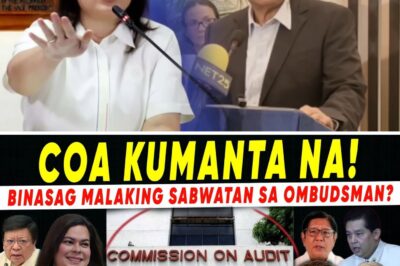In the dramatic, often chaotic landscape of Philippine politics, where power, wealth, and aggressive influence frequently dominate the narrative, there emerges a rare kind of leader—one whose impact is etched not in grand, aggressive gestures but in quiet, unyielding service. Maria Leonor “Leni” Gerona Robredo stands as a profound symbol of this counter-narrative. A woman whose path from a simple Bicolana to Vice President and back to the mayoralty of her hometown is a compelling testament to the core values of integrity, humility, and unwavering compassion for the marginalized. Her journey is a masterclass in resilience, a living proof that the true measure of leadership lies in the breadth of goodness achieved, not the height of the position held.
The current chapter of her life is perhaps the most defining, a compelling sequel to her political career. After navigating the highest, most scrutinized office of the land, she made a startling, yet perfectly logical, pivot back to her origins, being elected as the first female Mayor of Naga City in May 2025 (according to the current timeline). Her return is not an admission of defeat, but a declaration of purpose—a commitment to practice the good governance she preached on the national stage, but this time, with her hands back in the soil of her beloved community.
The Foundation of Service: From Bicol to the Bar
Leni Robredo’s identity is rooted firmly in Naga City, Camarines Sur, where she was born on April 23, 1965. Her family life provided an early template for her public service: her father, Antonio Gerona, was a Regional Trial Court Judge, and her mother, Salvation Santo Tomas, was a school teacher. This background—a fusion of judicial principle and pedagogical dedication—instilled in her the importance of both law and education.
She began her academic journey at the prestigious University of the Philippines Diliman, graduating with a Bachelor of Arts in Economics in 1986, a turbulent time marking the end of the Marcos dictatorship. Rather than pursuing a comfortable corporate path, she returned to Bicol and worked as a researcher at the Bicol River Basin Development Program (BRBDP). This hands-on experience, where she regularly interacted with farmers and the urban poor, was her political awakening. It opened her eyes to the stark realities faced by ordinary Filipinos, catalyzing her decision to pursue law at the University of Nueva Caceres.
Her path to the bar was anything but smooth, a crucial detail that humanizes her relentless determination. She failed her first attempt at the bar examinations but, despite the challenges of motherhood and life, she persevered, passing in 1997. This victory paved the way for her true passion: serving the marginalized. She became a lawyer for SALIGAN (Sentro ng Alternatibong Lingap Panligal), an NGO dedicated to providing free legal assistance to farmers, women, and the impoverished. This decade-long work cemented her commitment to advocacy over power, viewing the law as a tool for empowerment rather than profit.
The Robredo Legacy: Jesse’s Shadow and Leni’s Light
In 1987, she married Jesse Robredo, the dynamic, progressive mayor of Naga City who later became the Secretary of the Department of Interior and Local Government (DILG) under the Aquino administration. The Robredos became a rare symbol of simple, clean, and honest leadership in local governance. While Jesse implemented his transformative “Naga Lifestyle” model of governance, Leni remained the steadfast anchor of their home, actively engaged in women’s and community organizations, always prioritizing their three daughters: Jessica Marie, Janine Patricia, and Jillian Therese.
This harmonious family life was shattered by a national tragedy on August 18, 2012, when Jesse Robredo’s plane crashed off the coast of Masbate. His sudden death was a massive personal loss that instantly became a public tragedy. Yet, Leni, instead of retreating into private grief, utilized the tragedy as an unwelcome, painful catalyst to continue Jesse’s legacy. She reluctantly answered the call to public service, famously stating that while she had no political ambition, she was ready to serve if it was the only way to continue her husband’s work.
In 2013, she won a seat as the representative for the Third District of Camarines Sur. Despite a lack of political machinery and funding, she won through a sincere, person-to-person campaign. As a congresswoman, she tirelessly championed bills promoting transparency, accountability, people empowerment, and women’s rights. Her leadership style—open, consultative, and rooted in service—made her a beacon on the national stage, leading to her eventual nomination for the Vice Presidency in 2016.
The Vice Presidency: A Masterclass in Resourceful Service
Her unexpected victory over Ferdinand “Bongbong” Marcos Jr. in the 2016 Vice Presidential election was historic, immediately plunging her into the difficult reality of being a Vice President from a different political party than the President, Rodrigo Duterte. She was immediately given limited resources and was often sidelined, not even granted a cabinet post.
This challenge, however, became the defining characteristic of her tenure: resourceful service. She refused to allow political marginalization to render her office useless. Instead, she established the Angat Buhay Program, which grew into the largest anti-poverty initiative ever spearheaded by the Office of the Vice President (OVP). By strategically collaborating with the private sector and non-government organizations, the program provided assistance to thousands of impoverished families across hundreds of communities, proving that vision and partnership could compensate for lack of government funding.
During the devastating COVID-19 pandemic, the OVP under Robredo stepped into the void, providing critical resources that the government struggled to deliver. Her office organized shuttle services for frontliners, distributed PPEs, established community learning hubs, and pioneered mobile vaccination efforts. Year after year, despite the relentless political criticism and torrent of disinformation that targeted her on social media, the Commission on Audit (COA) consistently lauded her office for its efficiency and zero-irregularity reports. This objective fact stood as an irrefutable shield against her critics who often labeled her as “mahina” (weak) or ineffective.
The tension between Robredo and the administration peaked over the controversial War on Drugs. Her brief appointment as co-chair of the Inter-Agency Committee on Anti-Illegal Drugs was a political maneuver that quickly backfired. After she firmly advocated for a human rights-based, health-centered approach—instead of the aggressive violence—she was swiftly removed. She accurately summarized the experience, revealing the ultimate political betrayal: “Ginagamit lang ako bilang palamuti” (I was only used as an ornament). This moment solidified her reputation as a leader who prioritized principle over the retention of a position, a courage that resonated deeply with her supporters.
The Ultimate Test: Defeat, Rebirth, and the Angat Buhay Foundation
The 2022 Presidential campaign, running under the banner “Gobyernong Tapat, Angat Buhay Lahat” (Honest Government, Uplifting All Lives), was one of the most remarkable grassroots movements in modern Philippine history. It was characterized by an unprecedented wave of volunteerism from students, professionals, and ordinary citizens—the “kakampinks”—who believed in her message of clean, honest governance. Despite the massive momentum, she was defeated by Ferdinand Marcos Jr., the son of the former dictator she had beaten for the Vice Presidency six years prior.
Accepting the results with quiet dignity, Robredo demonstrated a profound commitment to democracy. Her mission, however, was not over. She did not seek political office immediately; instead, she chose to institutionalize her vision of service. She immediately established the Angat Buhay Foundation, a non-government organization dedicated to continuing the poverty alleviation, education, and health programs started during her OVP term. This act was a powerful message to her supporters and the nation: her advocacy was never dependent on her title.
The Return to the Soil: Mayor of Naga City
The next chapter in 2025 saw her make a remarkable return to local politics, choosing to run for Mayor of Naga City. Her landslide victory, making her the city’s first-ever female mayor, was a powerful vote of confidence from the community that knows her best. Her approach to the mayoralty has been defined by immediate, decisive action rooted in her commitment to accountability.
On her first day, she signed Executive Order No. 001, immediately establishing a Zero Tolerance Policy Against Corruption. This single act signaled that her local governance would be a laboratory for the clean, systematic leadership she fought for nationally.
Her programs in Naga City are holistic and visionary, focusing on tangible improvements:
Holistic Urban Planning: Implementing vital projects like flood control systems, bike lanes, and expanded green public spaces.
Digital Governance: Launching the May Naga App, a digital platform designed for transparent, efficient, and speedy public service delivery.
Health and Education: Modernizing the Naga City Hospital and expanding access to free medicine and educational support.
Community Empowerment: Actively forming local councils to ensure the voices of women, youth, and laborers are integrated into policy-making.
In Naga, Leni Robredo is not seen as a national politician who stepped down, but as a beloved daughter of the city who has returned to shepherd the home that raised her. Her systematic, compassionate, and transparent leadership style proves that a quiet, dignified approach can be profoundly effective. Her life journey—from the simple daughter of a judge to a tireless lawyer for the poor, a Vice President hounded by critics, and now, the hands-on Mayor of her home—is an enduring portrait of what true, dedicated leadership looks like. Her legacy is one of unwavering service, a powerful and necessary truth in a world obsessed with power: leadership is not dominance; it is a profound act of service.
News
The Unmasking of the Pillars: Ruby Rodriguez Breaks Two Decades of Silence, Exposing Alleged Favoritism, Control, and the ‘Dark Secrets’ of the Eat Bulaga Empire
For nearly half a century, Eat Bulaga has reigned supreme as a seemingly untouchable institution in Philippine media. It has…
The Ransom, The Laptop, and The Law: Paolo Bediones’ Courageous Fight Against Digital Voyeurism and His Inspiring Return to the Frontline
The world of Philippine media is notoriously unforgiving, a brilliant, dazzling arena where the highest of highs are often followed…
The Unwavering Corner: Freddie Roach’s Heroic Fight Against Parkinson’s as His Enduring Legacy Inspires a New Generation of Champions
In the brutal, unforgiving world of professional boxing, where success is measured by knockouts and spectacle, the true measure of…
COA Clears OVP in Landslide Rebuke to Political Sabotage as P39 Billion Flood Fund Scandal Exposes ‘Selective Justice’ at the Highest Levels
The Philippines finds itself at a chilling intersection of political vendetta, financial paradox, and human tragedy. In the wake of…
Ang Babala ni Gina na Binalewala: Ang Koneksyon ng Pagkatanggal Niya sa Nakakakilabot na Pagkakalbo ng Sierra Madrev
Sa bawat hagupit ng bagyo, sa bawat pagbaha na lumulunod sa mga bayan sa Cagayan at Isabela, sa bawat pagguho…
Huli sa Akto: Ang Trahedya ng Misis at Foreman na Nauwi sa Isang Brutal na Krimen
Sa tahimik na mundo ng isang ordinaryong komunidad, ang pinakamalaking halaga ay inilalagak sa tiwala. Tiwala sa loob ng tahanan,…
End of content
No more pages to load













